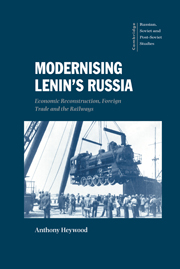Book contents
- Frontmatter
- Contents
- List of illustrations
- List of tables
- Acknowledgements
- Technical note
- List of abbreviations and acronyms
- Introduction
- PART I Towards economic reconstruction, 1917–1920 the birth of the railway imports policy
- PART II Trade and isolation, 1920–1921 implementing the railway imports policy
- PART III Retreat, 1921–1924
- 6 The new order
- 7 Denouement
- Conclusion
- Notes
- Bibliography
- Index
- Cambridge Russian, Soviet and Post-Soviet Studies
- Plate Section
7 - Denouement
Published online by Cambridge University Press: 14 August 2009
- Frontmatter
- Contents
- List of illustrations
- List of tables
- Acknowledgements
- Technical note
- List of abbreviations and acronyms
- Introduction
- PART I Towards economic reconstruction, 1917–1920 the birth of the railway imports policy
- PART II Trade and isolation, 1920–1921 implementing the railway imports policy
- PART III Retreat, 1921–1924
- 6 The new order
- 7 Denouement
- Conclusion
- Notes
- Bibliography
- Index
- Cambridge Russian, Soviet and Post-Soviet Studies
- Plate Section
Summary
By late August 1922 the Soviet leadership seemingly had good reason to consider its problems with the railway contracts more or less resolved. The Nohab order had been curtailed, there was a new VSNKh locomotive-building plan, and it remained simply to investigate the Railway Mission's commercial activity, abolish the mission and agree the NKPS–VSNKh contract. But in fact these issues would fester for up to three more years, and they raised awkward and far-reaching questions about policy-making responsibility, central authority, resources and economic recovery. Not one but several investigations would ensue, each basically treating Lomonosov as a scapegoat for the railway imports policy. Also, the mission's death agony was several months longer and rather more eventful than planned, including a final flurry of minor contracts and bureaucratic confusion. And Gosplan's compromise policy for locomotive construction collapsed disastrously amidst more retrenchment and expectations of very slow economic recovery.
The Avanesov commission
If several more months of Western comfort, with an opportunity to emigrate if necessary, were among Lomonosov's reasons for returning to Sweden in July 1922, another was his desire to be present in Berlin and Stockholm when the mission's commercial activity was audited. He expected vindictive vilification, and his worst forebodings seemed confirmed on 18 July when Sovnarkom appointed comrades Avanesov, Iaroslavskii and Medved'ev as the investigatory team, for he regarded Avanesov of the NKRKI and Cheka as one of his worst slanderers.
- Type
- Chapter
- Information
- Modernising Lenin's RussiaEconomic Reconstruction, Foreign Trade and the Railways, pp. 200 - 224Publisher: Cambridge University PressPrint publication year: 1999

